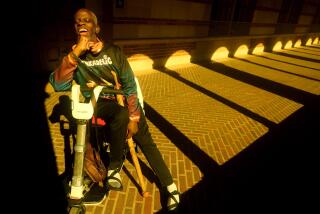Cerebral Palsy Betrays Body, But Can’t Harm a Strong Mind
- Share via
Born with cerebral palsy, Theodore A. Pinnock was institutionalized for the first 17 years of his life. He had been labled mentally retarded.
Pinnock does not walk. He does not speak clearly. He can require help eating.
But about 10 days ago, he learned that he had passed the California Bar Exam, the toughest in the nation. At a Coronado hotel this morning, he is due to be sworn in as a lawyer.
What pleases the 28-year-old Pinnock about that more than anything--more than the thrill of passing the bar, more than the relief of not having to endure the ordeal of the exam all over again--is that it means he’s eligible to be deemed just one among the bunch. That’s the goal, he said, to be just plain normal.
“I don’t want to be defined as a wonderful disabled person,” Pinnock said late last week. “I want to be defined as a human being that can support his family and becomes involved in the community.”
However, according to Pinnock’s friends and his professors at Western State University in San Diego, where he earned his law degree, it’s difficult to think of him as just plain normal.
Richard G. Prantil, who car-pooled with Pinnock during their first year of law school, said Pinnock is “probably the most amazing person I have ever met in my life.
“I will tell you, a lot of times I figured I couldn’t go on,” Prantil said. “And I said, ‘How must Art feel at this time?’ So I kept going.” Prantil now practices family law with a firm in San Diego.
Moise Berger, who taught Pinnock’s evidence class, said he was unsure at first that Pinnock belonged in law school. But, Berger said, after a few weeks of sparring over cases in class with Pinnock, he changed his mind.
“When you have somebody you know has a goal, and they are obviously very determined to reach that goal, you don’t think of him as having any kind of disability,” Berger said.
Berger added a few moments later, “He’s normal. But he’s not normal, because he’s so exceptional in the way he’s overcome these things.”
Pinnock is the ninth of 10 children. His father, a Jamaican immigrant, was a factory worker. His mother was a cook.
Cerebral palsy is a motor disorder caused by brain damage incurred before or during birth. For Pinnock, it means he cannot stand up, get in the tub, get in and out of the car. It also means he has a speech impediment that occasionally makes conversation difficult.
Most of his friends know him as Art, which is easy for him to say. He also is called Ted, but that sound is harder for him to make. “I like my other name but I can’t say it that well,” he said.
“The only thing I wish I can do better is talk,” he said. In Hartford, Conn., where Pinnock grew up, he was diagnosed as retarded. He was shunted to institutions until he was 17.
Pinnock insisted, however, on going to school. A 1975 federal law permitted him, and other disabled kids, to go to public school. In high school, while taking a steady stream of college preparatory classes, he earned A’s and B’s. But he got no support from counselors for going to college, he said.
But he persisted, and enrolled at the University of Connecticut. In 1984, he earned a bachelor’s degree in psychology. The next year, he got a master’s in political science.
Pinnock decided to try law school. Mostly, he was rejected. But he got into Western State. “I got on an airplane by myself when I moved,” he said. “My mother thought I was crazy.”
During school, he would take part in class, then go home and type his notes. “His memory is incredible,” Prantil said. “He would sit in our classes and go home and, word for word, dictate the lecture.”
“In class,” evidence professor Berger said, “I used to call on him for two reasons, in spite of it holding up class while he answered.
“One, I thought he should feel like he’s one of the rest of us, that he didn’t get some kind of breaks. Two, I wanted him to feel prepared. If he came out of law school without knowing his job, that wouldn’t be good for the public he’s representing (as a lawyer). He had to perform, just like everybody else.”
During law school, Pinnock got married. He and his wife, Nancy, now have a 2-year-old daughter, Kassandra. She dotes on her daddy, hanging around his wheelchair while he talks with guests and while he taps at his computer.
Nancy Pinnock, 25, who met her husband through a dating service, savors life with him. They courted by mail for six months before he flew to the Philippines and married her.
“Even today, when we go out, some people look at us,” she said. “My husband, the way he is, he’s in a wheelchair. And there’s the way he talks.
“I always have to tell people he went to law school, that he graduated,” she said. “After I say that, there’s a difference in the way they treat my husband. It’s so funny. They act differently. They start calling him Mr. Pinnock.”
After graduating from Western State last year, Pinnock took the dreaded bar. It’s a three-day exam, with 200 multiple-choice questions, then six essay questions on any of a dozen subjects. In recent years, the pass rate has been about 50%.
During the 1990 exam, Pinnock’s electric typewriter broke. “When I got my bar results, I missed by one point,” he said. Again, it was time to persist. He had to take the whole exam over again.
During school, Pinnock and his family were able to live, in part, on student loans. For the past year, however, while sweating out a second go-round at the bar, they have survived on $1,300 a month in government aid.
His second shot at the bar came last February. “When I took it for the second time, I took two electric typewriters with me,” he said. It wasn’t until late May that he learned that, this time, he had passed.
“I was very relieved and very proud,” Pinnock said. “Now I want to get on with my life.”
Which means yet another challenge. Law firms in San Diego have not offered him a job.
“In the last year, I did apply to a lot of law firms,” Pinnock said. “But they were not receptive.”
In the meantime, Pinnock has opened his own business. Called ADA Consulting Services, it’s aimed at explaining ADA, the Americans with Disabilities Act, a 1990 federal civil rights law for what the law calls “persons with disabilities.”
Already Pinnock has produced two separate guides--one aimed at employers, one for people with disabilities. Please, Pinnock said, don’t use the phrase “disabled people.” It’s “persons with disabilities.”
“All the articles I read on the new law, they can’t get the terminology straight,” he said. “You can tell they didn’t do their homework.”
Maybe a law job will pop up, Pinnock said. If not, maybe the business will take off. It’s on to some sort of new challenge, he said.
“I want to make a difference,” he said. “By doing things for the community.
“I just want to work like everybody else. I do not want to rely on government aid. I want my wife and my daughter to be provided for. I want to be treated equally by my colleagues, by other California lawyers. That’s all I want.”
More to Read
Sign up for Essential California
The most important California stories and recommendations in your inbox every morning.
You may occasionally receive promotional content from the Los Angeles Times.













